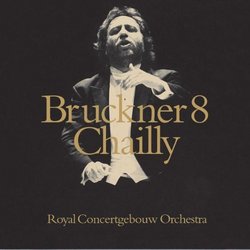| All Artists: Anton Bruckner, Riccardo Chailly, Royal Concertgebouw Orchestra Title: Bruckner: Symphony No. 8 Members Wishing: 0 Total Copies: 0 Label: Decca Original Release Date: 1/1/2002 Re-Release Date: 7/16/2002 Genre: Classical Style: Symphonies Number of Discs: 1 SwapaCD Credits: 1 UPC: 028946665329 |
Search - Anton Bruckner, Riccardo Chailly, Royal Concertgebouw Orchestra :: Bruckner: Symphony No. 8
 | Anton Bruckner, Riccardo Chailly, Royal Concertgebouw Orchestra Bruckner: Symphony No. 8 Genre: Classical
Pairing one of the world's great orchestras with one of the day's top Brucknerians produces a superb performance. Chailly's eccentricity-free Eighth glows with conviction. He achieves his results through careful attention ... more » |
Larger Image |
CD DetailsSynopsis
Amazon.com Pairing one of the world's great orchestras with one of the day's top Brucknerians produces a superb performance. Chailly's eccentricity-free Eighth glows with conviction. He achieves his results through careful attention to the score, ensuring that every telling detail makes its effect without exaggeration. He secures phenomenal playing from his orchestra, and carefully calibrates dynamics and balances. The result for the listener is to forget about the mechanics of the work and be drawn into Bruckner's message of struggle and acceptance. Throughout, one is amazed at the power of the Concertgebouw's low brass, its spectacular wind soloists, and its deep, rich strings. Chailly doesn't overplay the climaxes, so you may find more of the work's brute force elsewhere, but you get a better sense of the work's structure than most of the competition offers. And in the long, central Adagio and the Finale, his apt phrasing and precision produce a tremendous emotional effect. The Adagio movement, in particular, comes across as deeply moving, and Chailly communicates its underlying tensions, so that, for once, its great length never seems a minute longer than it has to be. One of the great Eighths, and one of the best engineered as well. --Dan Davis Similar CDs
|
CD ReviewsAn outstanding new recording of Bruckner's zenith Bruce Hodges | New York, NY | 10/14/2002 (5 out of 5 stars) "Of Bruckner's work, this symphony is surely his most triumphant and moving creation. From a few simple notes in a descending scale, he creates a vast landscape alternating between quietly touching passages and those that are thrillingly immense. Chailly and the Concertgebouw are in the midst of what appears to be a complete Bruckner cycle; they have already recorded numbers 2, 4, 5, 6, and 9. (Chailly recorded the 7th with the RSO Berlin, also excellent.) The Eighth is enormous - about 80 minutes long - and Chailly has the full measure of the work's massive structure, but takes care to allow the myriad details to come through. The half-hour long "Adagio" (for many listeners the high point of the piece) is done with great feeling and mystery, and the orchestra is as sublime as anyone could wish for. Actually, the playing everywhere is superb; take for example, the galloping, thrilling opening of the final movement. The sheer power of the orchestra will sweep you away. As someone who greatly admires this piece, I have a number of versions, with Haitink, Tennstedt, Karajan, Furtwängler and Welser-Möst as the most interesting so far. But this excellent newcomer is self-recommending, and fits on a single disc, making it a relative bargain as well. (NB: Chailly uses the Nowak edition, for those who are interested.)A great piece, performed by one of the finest orchestras in the world, collaborating with one of the world's great conductors. Spectacular sound to boot." A spectacular recording, even for Chailly jhorro | VA | 05/15/2003 (5 out of 5 stars) "I am familiar with several versions of this symphony; the Chailly recording really ties this symphony together. There are certain balancing issues in previous recordings that have been handled superbly in this version, especially in the last movement. I think Chailly is generally more thoughtful than either Boulez (in Vienna) or Kubelik (in Chicago), as fine as the new Boulez recording is. [This is not the Boulez of several years ago, but that is another matter.] Bruckner is not new music to the Concertgebouw, but this is not the heavy reading that Karajan secured in Berlin. Perhaps the second Karajan version from Vienna has not been surpassed, but for those like myself who like a clean, studio recording with a first-class orchestra (which a Bruckner recording definitely needs), this is a safe and satisfying version, beautifully played." Apocalyptic Bruckner Erik North | San Gabriel, CA USA | 08/11/2004 (5 out of 5 stars) "Bruckner was a composer well known for creating symphonies on a huge scale for his cathedrals of sound, and the Eighth Symphony is proof of that, especially when heard in this apocalyptic 1999 London/Decca recording by Riccardo Chailly and the Concertgebouw Orchestra of Amsterdam.
Both conductor and orchestra are quite familiar with the massive works of Bruckner, and their combination produces massive dividends of sonic impact. The characteristic Bruckner traits--the strong tremelos; the sudden increases in volume; the massive chorales from the trombones, horns, trumpets, and tubas--are all in evidence in the Eighth (as well as the addition of harp and, in two places during the Adagio, cymbals), and Chailly gets the most from his Amsterdam forces in displaying them. The ominous opening measures prepare the listner for a nearly 80-minute journey of staggering proportions; and the epic scherzo is also handled with power. The final movement's vigorous opening measures presage the "Mars" section of Gustav Holst's "The Planets" by a good three decades, and the orchestra really lets out with a blast. Although not officially known by name, the Eighth is sometimes referred to as Bruckner's "Apocalyptic" Symphony. And from this explosive recording, it would more than live up to that appelation." |

 Track Listings (4) - Disc #1
Track Listings (4) - Disc #1

